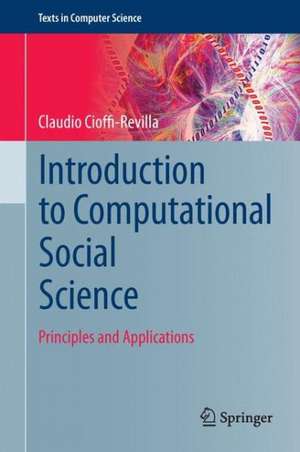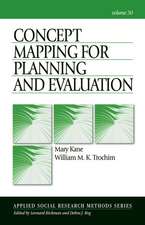Introduction to Computational Social Science: Principles and Applications: Texts in Computer Science
Autor Claudio Cioffi-Revillaen Limba Engleză Hardback – 14 ian 2014
| Toate formatele și edițiile | Preț | Express |
|---|---|---|
| Paperback (1) | 1180.01 lei 38-45 zile | |
| Springer International Publishing – 13 mai 2018 | 1180.01 lei 38-45 zile | |
| Hardback (2) | 454.31 lei 38-45 zile | |
| SPRINGER LONDON – 14 ian 2014 | 454.31 lei 38-45 zile | |
| Springer International Publishing – 10 iul 2017 | 1452.52 lei 38-45 zile |
Din seria Texts in Computer Science
- 20%
 Preț: 406.21 lei
Preț: 406.21 lei - 20%
 Preț: 675.36 lei
Preț: 675.36 lei - 20%
 Preț: 370.59 lei
Preț: 370.59 lei - 20%
 Preț: 474.58 lei
Preț: 474.58 lei - 20%
 Preț: 306.37 lei
Preț: 306.37 lei - 20%
 Preț: 366.94 lei
Preț: 366.94 lei - 20%
 Preț: 1244.39 lei
Preț: 1244.39 lei - 20%
 Preț: 503.88 lei
Preț: 503.88 lei - 20%
 Preț: 379.65 lei
Preț: 379.65 lei - 20%
 Preț: 444.93 lei
Preț: 444.93 lei - 20%
 Preț: 411.75 lei
Preț: 411.75 lei - 20%
 Preț: 305.31 lei
Preț: 305.31 lei - 17%
 Preț: 366.70 lei
Preț: 366.70 lei - 20%
 Preț: 409.70 lei
Preț: 409.70 lei - 20%
 Preț: 370.23 lei
Preț: 370.23 lei - 20%
 Preț: 411.53 lei
Preț: 411.53 lei - 20%
 Preț: 441.71 lei
Preț: 441.71 lei - 20%
 Preț: 423.53 lei
Preț: 423.53 lei - 20%
 Preț: 515.36 lei
Preț: 515.36 lei - 15%
 Preț: 637.58 lei
Preț: 637.58 lei - 20%
 Preț: 353.34 lei
Preț: 353.34 lei - 20%
 Preț: 356.82 lei
Preț: 356.82 lei - 20%
 Preț: 743.62 lei
Preț: 743.62 lei - 20%
 Preț: 663.45 lei
Preț: 663.45 lei - 20%
 Preț: 536.66 lei
Preț: 536.66 lei -
 Preț: 457.75 lei
Preț: 457.75 lei - 20%
 Preț: 181.92 lei
Preț: 181.92 lei - 20%
 Preț: 330.42 lei
Preț: 330.42 lei - 20%
 Preț: 358.24 lei
Preț: 358.24 lei -
 Preț: 385.84 lei
Preț: 385.84 lei - 20%
 Preț: 394.57 lei
Preț: 394.57 lei - 20%
 Preț: 344.76 lei
Preț: 344.76 lei - 20%
 Preț: 621.18 lei
Preț: 621.18 lei - 20%
 Preț: 350.86 lei
Preț: 350.86 lei - 20%
 Preț: 348.89 lei
Preț: 348.89 lei - 20%
 Preț: 339.95 lei
Preț: 339.95 lei - 20%
 Preț: 588.21 lei
Preț: 588.21 lei - 20%
 Preț: 199.57 lei
Preț: 199.57 lei - 20%
 Preț: 341.30 lei
Preț: 341.30 lei - 23%
 Preț: 726.94 lei
Preț: 726.94 lei - 20%
 Preț: 325.30 lei
Preț: 325.30 lei - 20%
 Preț: 595.80 lei
Preț: 595.80 lei - 20%
 Preț: 593.48 lei
Preț: 593.48 lei
Preț: 454.31 lei
Nou
Puncte Express: 681
Preț estimativ în valută:
86.94€ • 92.96$ • 72.48£
86.94€ • 92.96$ • 72.48£
Carte tipărită la comandă
Livrare economică 14-21 aprilie
Preluare comenzi: 021 569.72.76
Specificații
ISBN-13: 9781447156604
ISBN-10: 1447156609
Pagini: 356
Dimensiuni: 155 x 235 x 25 mm
Greutate: 0.79 kg
Ediția:2014
Editura: SPRINGER LONDON
Colecția Springer
Seria Texts in Computer Science
Locul publicării:London, United Kingdom
ISBN-10: 1447156609
Pagini: 356
Dimensiuni: 155 x 235 x 25 mm
Greutate: 0.79 kg
Ediția:2014
Editura: SPRINGER LONDON
Colecția Springer
Seria Texts in Computer Science
Locul publicării:London, United Kingdom
Public țintă
GraduateDescriere
The emerging field of computational social science (CSS) is devoted to the pursuit of interdisciplinary social science research from an information processing perspective, through the medium of advanced computing and information technologies.
This reader-friendly textbook/reference is the first work of its kind to provide a comprehensive and unified Introduction to Computational Social Science. Four distinct methodological approaches are examined in particular detail, namely automated social information extraction, social network analysis, social complexity theory, and social simulation modeling. The coverage of each of these approaches is supported by a discussion of the historical context and motivations, as well as by a list of recommended texts for further reading.
Topics and features: describes the scope and content of each area of CSS, covering topics on information extraction, social networks, complexity theory, and social simulations; highlights the main theories of the CSS paradigm as causal explanatory frameworks that shed new light on the nature of human and social dynamics; explains how to distinguish and analyze the different levels of analysis of social complexity using computational approaches; discusses a number of methodological tools, including extracting entities from text, computing social network indices, and building an agent-based model; presents the main classes of entities, objects, and relations common to the computational analysis of social complexity; examines the interdisciplinary integration of knowledge in the context of social phenomena.
This unique, clearly-written textbook is essential reading for graduate and advanced undergraduate students planning on embarking on a course on computational social science, or wishing to refresh their knowledge of the fundamental aspects of this exciting field.
This reader-friendly textbook/reference is the first work of its kind to provide a comprehensive and unified Introduction to Computational Social Science. Four distinct methodological approaches are examined in particular detail, namely automated social information extraction, social network analysis, social complexity theory, and social simulation modeling. The coverage of each of these approaches is supported by a discussion of the historical context and motivations, as well as by a list of recommended texts for further reading.
Topics and features: describes the scope and content of each area of CSS, covering topics on information extraction, social networks, complexity theory, and social simulations; highlights the main theories of the CSS paradigm as causal explanatory frameworks that shed new light on the nature of human and social dynamics; explains how to distinguish and analyze the different levels of analysis of social complexity using computational approaches; discusses a number of methodological tools, including extracting entities from text, computing social network indices, and building an agent-based model; presents the main classes of entities, objects, and relations common to the computational analysis of social complexity; examines the interdisciplinary integration of knowledge in the context of social phenomena.
This unique, clearly-written textbook is essential reading for graduate and advanced undergraduate students planning on embarking on a course on computational social science, or wishing to refresh their knowledge of the fundamental aspects of this exciting field.
Cuprins
Introduction
Computation and Social Science
Automated Information Extraction
Social Networks
Social Complexity I: Origins and Measurement
Social Complexity II: Laws
Social Complexity III: Theories
Simulations I: Methodology
Simulations II: Variable-Oriented Models
Simulations III: Object-Oriented Models
Computation and Social Science
Automated Information Extraction
Social Networks
Social Complexity I: Origins and Measurement
Social Complexity II: Laws
Social Complexity III: Theories
Simulations I: Methodology
Simulations II: Variable-Oriented Models
Simulations III: Object-Oriented Models
Recenzii
From the book reviews:
“This 300 pages book a very good introduction to CSS, as it covers all relevant aspects that are fundamental to start a CSS research. … the book could be used for teaching methodological aspects of modeling in the social sciences … . Claudio-Cioffi’s book is a must read for any beginner of CSS. … It is a great synthesis of the main achievements in this field that could be fruitfully adopted by anyone teaching CSS as an introductory guide.” (František Kalvas, jasss.soc.surrey.ac.uk, February, 2015)
“It is a nice introduction for beginners to grasp the fundamentals of CSS. … This well-organized book provides a timely and comprehensive systematic introduction to CSS. The chapters are relatively independent. … Although this book is intended as a CSS textbook for graduate students … anyone who is interested in the fundamentals of CSS would benefit from reading it.” (Chenyi Hu, Computing Reviews, August, 2014)
“This 300 pages book a very good introduction to CSS, as it covers all relevant aspects that are fundamental to start a CSS research. … the book could be used for teaching methodological aspects of modeling in the social sciences … . Claudio-Cioffi’s book is a must read for any beginner of CSS. … It is a great synthesis of the main achievements in this field that could be fruitfully adopted by anyone teaching CSS as an introductory guide.” (František Kalvas, jasss.soc.surrey.ac.uk, February, 2015)
“It is a nice introduction for beginners to grasp the fundamentals of CSS. … This well-organized book provides a timely and comprehensive systematic introduction to CSS. The chapters are relatively independent. … Although this book is intended as a CSS textbook for graduate students … anyone who is interested in the fundamentals of CSS would benefit from reading it.” (Chenyi Hu, Computing Reviews, August, 2014)
Notă biografică
Dr. Claudio Cioffi-Revilla is Professor of Computational Social Science, founding and former Chair of the Department of Computational Social Science and founding and current Director of the Center for Social Complexity at George Mason University, VA, USA.
Textul de pe ultima copertă
The emerging field of computational social science (CSS) is devoted to the pursuit of interdisciplinary social science research from an information processing perspective, through the medium of advanced computing and information technologies.
This reader-friendly textbook/reference is the first work of its kind to provide a comprehensive and unified Introduction to Computational Social Science. Four distinct methodological approaches are examined in particular detail, namely automated social information extraction, social network analysis, social complexity theory, and social simulation modeling. The coverage of each of these approaches is supported by a discussion of the historical context and motivations, as well as by a list of recommended texts for further reading.
Topics and features:
This reader-friendly textbook/reference is the first work of its kind to provide a comprehensive and unified Introduction to Computational Social Science. Four distinct methodological approaches are examined in particular detail, namely automated social information extraction, social network analysis, social complexity theory, and social simulation modeling. The coverage of each of these approaches is supported by a discussion of the historical context and motivations, as well as by a list of recommended texts for further reading.
Topics and features:
- Describes the scope and content of each area of CSS, covering topics on information extraction, social networks, complexity theory, and social simulations
- Highlights the main theories of the CSS paradigm as causal explanatory frameworks that shed new light on the nature of human and social dynamics
- Explains how to distinguish and analyze the different levels of analysis of social complexity using computational approaches
- Discusses a number of methodological tools, including extracting entities from text, computing social network indices, and building an agent-based model
- Presents the main classes of entities, objects, and relations common to the computational analysis of social complexity
- Examines the interdisciplinary integration of knowledge in the context of social phenomena
Caracteristici
<p>Introduces the key concepts in computational social science, providing formal definitions and a glossary</p>
<p>Describes the scope of each sub-field, covering topics on information extraction, social networks, complexity theory and social simulations</p>
<p>Discusses such methodological tools as extracting entities from text, computing social network indices and building an agent-based model</p>
<p>Describes the scope of each sub-field, covering topics on information extraction, social networks, complexity theory and social simulations</p>
<p>Discusses such methodological tools as extracting entities from text, computing social network indices and building an agent-based model</p>


















